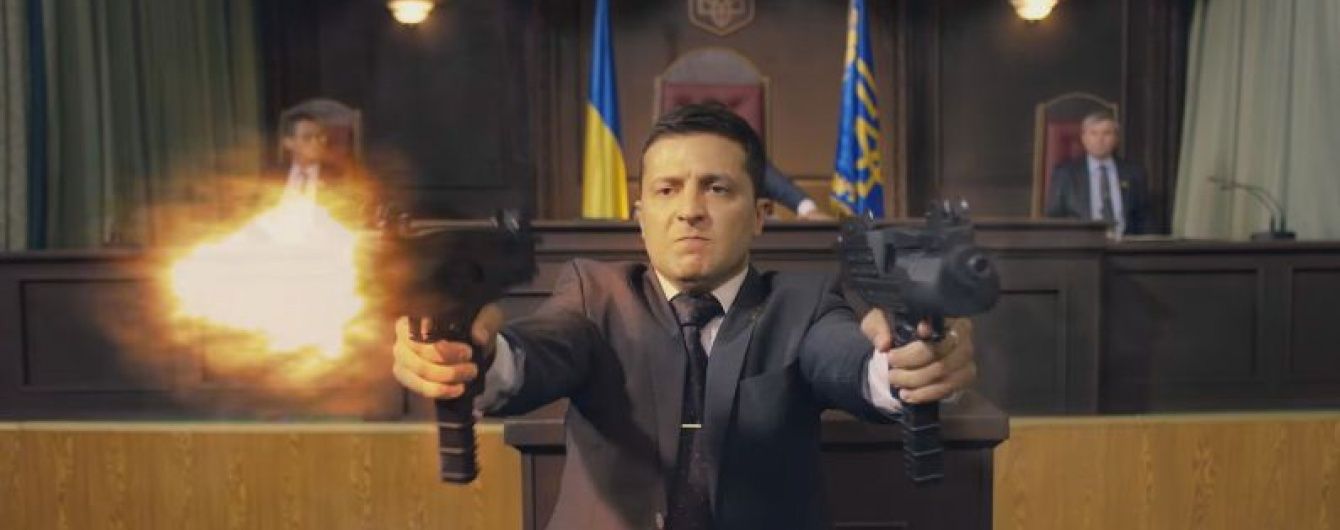Although both candidates declare their pro-western course, the supporters of Poroshenko accuse Zelenskyy to be tolerant to Russian aggression and unable to withstand Putin, serving oligarch Kolomoiskyi’s interests. At the same time, Poroshenko is accused of corruption. Though the existing evidence of corruption incriminates Poroshenko’s close colleagues who, admittedly, still walk free, and not him directly, this cloud of corruption overshadows any other Poroshenko’s achievements of the last 5 years. To understand where the real division between two groups of voters lies, let’s look on the most important strengths and faults of candidates, to which their supporters and opponents appeal.
Professionalism
The pre-recorded interview of Zelenskyy with journalists of the ICTV channel started with the question “You are in politics already for three months. What are your impressions?” Zelenskyy’s opponents point to the irony in this question, arguing that a person with three months of political experience can’t be a president. Zelenskyy answered in the same interview:
“Who is in our team? We are all not from politics. We are from TV, we’re artists, producers. How we will win the elections? We will. Isn’t it an example of how we can win without a professional team, without experience? It is.”
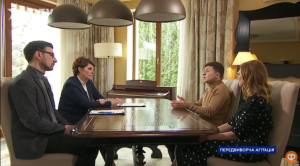
Poroshenko is totally different in this regard. He is in politics since 1998. He was an MP in the Verkhovna Rada several times, the secretary of the National Security and Defense Council (2005), and the minister of Foreign Affairs (2009-2010) during Yushchenko’s presidency. He also was Minister of Economic Development and Trade at the time of Viktor Yanukovych’s presidency. Being one of the Ukrainian oligarchs himself, Poroshenko is blamed to be from the old system, unable to break up old personal ties and implement reforms with required passion.
Zelenskyy hints about Poroshenko in his presidential program. He writes:
“For 28 years, Ukraine was managed by ‘professional state-makers,’ and today it is a simply uncompetitive state… Current politics are tied to old images, nepotism, business projects… My main task is to bring decent and patriotic specialists to power.”
Indeed, if the goal is to change tge staff, not policies, three months of political experience may be enough for Zelenskyy. However, a candidate should have at least a basic understanding of presidential responsibilities and constitutional powers.
For a long time, Zelenskyy’s opponents found it hard to accuse Zelenskyy of being ignorant about politics in a fact-based manner. According to the famous philosophical rule, there is no possibility to prove the absence of something and to speak in any way about nothingness. The same went for Zelenskyy — he hasn’t told much about his future policies and hasn’t shown many team members yet. It was hard to criticize him, unlike Poroshenko.
However, after his political demands to Poroshenko on 3 April, a piece of strong evidence finally appeared. The candidate confused the key responsibilities of Parliament and President.
The number of demands, among others, includes such things as:
- ensure adoption of the law on the cancellation of the declaration of incomes and expenses for public activists. HOWEVER, the president can’t ensure the adoption of any law, even by the influence of his party which doesn’t hold the majority alone.
- restart the NAZK (National Agency for Prevention of Corruption) by new staff appointments. HOWEVER, NAZK is an institution appointed by the Cabinet, NOT by the president.
- publish a list of Poroshenko’s offshore companies, banks in which these companies have accounts, as well as financial statements of these companies over the past five years. BUT all data about property, assets, and deposits of Poroshenko is already publicized.
Poroshenko, obviously, is an expert in the field of international relations diplomacy, military, and security issues due to his experience, but his key problem seems to be with his team members.
The candidates’ teams
Loud scandals involving the top members of Poroshenko’s political team inflicted a devastating blow to the reputation of the incumbent president, especially against the backdrop of Poroshenko’s billions of hryvnias of wealth.
These scandals created the image of Poroshenko as the chief of corruption in Ukraine, stealing even from the defense industry. Although there is still no evidence of Poroshenko trying to make illegal profits himself, his disregard of the violations of his colleagues as well as the reluctance of the NABU (National anti-corruption bureau of Ukraine), which is subjected to the President, to investigate loud cases made a bad reputation for him.
Here are just a few cases:
In 2016, Ihor Kononenko, former deputy head of the Poroshenko Bloc, was accused of lobbying the appointment of desired people to managing positions of the main state enterprises. According to Aivaras Abromavicius, Minister of economic development and trade of that time who now professes his support for Zelenskyy, Ihor Kononenko and other members of Poroshenko’s political party were blocking the work of the ministry and there were from the President’s Administration to appoint desired people. Finally, Aivaras Abromavicius resigned, willing “to simplify the task of Kononeko and his team.”
Next to none of the policemen who killed 106 protesters during the Euromaidan revolution were punished over the five years after the uprising. Law enforcement agencies claim this to be a failure of the Prosecutor’s office, which is subordinated to the president.
In 2016, Poroshenko made a scandalous decision to appoint Yuriy Lutsenko as Prosecutor General. Lutsenko is unskilled for this particular position, as he doesn’t have a law degree. However, he was a close ally of Poroshenko, never opposing the President’s will. Generally, 2016 became the year when Poroshenko tried to consolidate power around himself by changes in the government and a number of new appointments which were criticized by civil society.
The latest corruption-related scandal in the Ukrainian state defense monopolist Ukroboronprom had hit Poroshenko especially hard. Oleh Hladkovskyi, the First Deputy Secretary of the National Security and Defense Council appointed by the President, and his son Ihor Hladkovskyi were the main officials who managed purchases of the details for the military vehicles from fictitious companies by an overcharge. A Bihus journalist investigation claimed that President’s friends laundered at least US$9.2mn in state defense procurements
Read also:
- Poroshenko’s man in defense industry accused of graft & smuggling: truth or pre-election manipulation?
- A new General Prosecutor for Poroshenko
- Only 1 person serving sentence for Maidan killings, says Prosecutor General’s Office
After the first round of elections, Poroshenko recognized that he made mistakes with staff appointments. He talked about this at the meeting with civil activists on 6 April and signed the resignation letter of Andryi Hordieiev, the Head of Kherson Oblast Administration who was possibly implicated to the murder of the journalist Kateryna Handziuk, a whistleblower exposing local corruption schemes. Oleh Hladkovskyi, accused of money laundering in the defense industry, was also dismissed by Poroshenko.
However, when Poroshenko was asked in the ICTV interview to name all the team members whom he will dismiss and who are guilty, he shied away from the question, answering that “no business partners, no close people will be appointed by Petro Poroshenko anymore while he is president, including during the second term.”
Volodymyr Zelensky’s team is still not completely known, but the personalities who have already been named are also not absolutely clean.
“In the sphere of bills and ideology, we have about 50 people. These are serious practitioners, PhDs, professors, this is the level of people involved in lawmaking, the level of very powerful economists who have a good education, including Harvard University.” – Ruslan Stefanchuck, “the head in the sphere of ideology” from Zelenskyy’s team, explained.
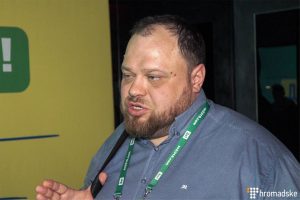
Yet, among the already known members of Zelenskyy’s headquarters, there are several persons linked to Russia or to oligarch Kolomoyskyi.
Dmytro Razumkov, the main political advisor of Zelenskyy, gives rise to suspicions. He usually acts as the spokesman for Zelenskyy’s team. Yet, in 2006 he began his political career in the Party of the Regions, led by ex-President Yanukovych. Therefore, it’s no surprise that he is quite pro-Russian or, at least, indifferent to Ukrainian national identity. He commented that:
“Questions about [the Ukrainian] language are raised before the elections, which is a problem. In fact, everything that can divide Ukrainians: faith, language, territory, some historical leaders – need to be taken out of the equation, at least until we finish the war.”
The ties between Zelenskyy and oligarch Ihor Kolomoiskyi are quite obvious, despite Zelenskyy denying them. Kolomoiskyi supports the candidate by the media-coverage at his 1+1 channel, giving all the prime-hours to him, and even provides his guards for Zelenskyy.
The recent Bihus.info journalist investigation revealed that Andriy Bohdan, Ihor Kolomoiskyi’s main lawyer, is usually present at Zelenskyy’s headquarters as a kind of “observer.” Also, he presents Zelenskyy at the most important official meetings. Finally, during the last three months, he had flown 20 times from Kyiv to Geneva – from Zelenskyy’s headquarters to Ihor Kolomoiskyi’s.
Zelenskyy still didn’t name who will be appointed for the key offices in the case of his victory (such as Minister of the Foreign affairs, Minister of defense, Head of Security service). Yet, on 9 April, his team published an expanded list of experts who currently advise the candidate. The list contains some well-known and experienced politicians such as former Finance Minister Oleksandr Danyliuk and former Minister of Economic Development and Trade Aivaras Abromovicius, as well as former Deputy Minister of Justice Ruslan Riaboshapka.
These skilled persons were among the reformers and members of anti-corruption initiatives in the governments of 2014-2018 but all left the government due to disagreement with particular policies of the prime minister. However, their role in the team of Zelenskyy is still not clear since they didn’t state anything publicly on this behalf.
Moreover, Marta Bersh doesn’t know anything about her possible appointment as Prosecutor General, journalists uncovered. She is an American but used to work as a prosecutor in the Ukrainian National Anti-Corruption Bureau for some time. Zelensky’s team included her to the list of their team members as a future Prosecutor General without notifying her. Moreover, they even mistakenly wrote her foreign surname in a Ukrainian manner – Borshch instead of Bersh, claiming she is a Ukrainian.
Regarding the other members of the team, they’re rather unknown and come mainly from business. Oleg Bondarenko, head of the Green Fund, joined the team of Zelensky as an expert on ecology and law. However, leading Ukrainian eco-NGOs such as “Ecology, people, law” know nothing about this “Green Fund.” The web-page of the Fund started to be quite active only in 2019.
Oleksandr Kharebin, Zelensky’s adviser on language and information policy, has been working for pro-Russian oligarch Kurchenko and Taruta. In an interview he expressed views which stand far away from Ukraine’s current policy of decommunization and support for national language and culture:
“Ukraine, in my opinion, makes the greatest mistake in refusing the past heritage of the Soviet Union, that which is the basic value for Ukraine [emphasis ours – EP]. Why did we give the Great Patriotic War to Russia? In my opinion, it’s a mistake. Why do we not speak about the Russian language as an important part of the Ukrainian community?”
Program and course for the next 5 years
The difference in the programs of candidates is simply explained:
Poroshenko appeals to the things which were already done, such as the visa-free regime with EU, international support for Ukraine, military improvement, new missiles, stabilization of economy, decentralization. Poroshenko emphasizes the need to continue and finish reforms as well as to overcome poverty. In his program, Poroshenko defines explicitly the course in international relations:
“International sanctions against the aggressor are firmly tied to the complete de-occupation of the Ukrainian Donbas and Ukrainian Crimea, and all our citizens and territories must return to Ukraine’s sovereignty.” “Peace is a complete restoration of the territorial integrity, sovereignty, and independence of Ukraine. Peace is Moscow’s undeniable recognition of our right to go our own way”
Zelenskyy makes populist promises regarding the rise of economy and income. His program contains little explanation as to how goals like this one could be achieved:
“The state budget must become a national treasury, not a system of interests of people’s deputies.”
The other key point is the power of people through local and national referendums which should become a widespread practice in Ukraine.
Zelenskyy promises a decline in taxes and the rise in social payments and salaries for teachers simultaneously. Zelenskyy also promises a free land market as well as the liberalization of the economy. However, whether this liberalization will facilitate large oligarchs’ or small enterprises, as well as how it should be implemented – this would be interesting to hear from Zelenskyy during debates.

Once Zelenskyy’s team promised to raise salaries for teachers to $4000. They calculated that this would cost an overall $200 mn annually, but made elementary arithmetic mistakes – in reality, this could cost $2 bn per month to the state budget. When the mistake was pointed out, they simply edited the video.
The first ten steps to be done were announced by Zelenskyy’s team, not himself. They include mainly the continuation of current reforms which already started. Among the novel proposals are economic laws on a tax amnesty in order to legalize the shadow economy. Another proposal outlines the possibility for citizens to solve their disputes not only in the courts but through mediation as well. Important points proposed by Zelenskyy are to clearly define the difference between General Staff and Ministry of Defense and to Invite the USA and Great Britain to the Normandy Group, a diplomatic group of senior representatives from Ukraine, Russia, Germany, and France to resolve the war in eastern Ukraine.
However, security questions, and, particularly, the war in eastern Ukraine – the main responsibilities of the president – are not properly addressed.
“National interests and territories cannot be the subject of any negotiations,” states Zelenskyy in his program. At the same time, his main goal is “that shooting stops” in eastern Ukraine. Zelenskyy told this in an interview with Ukrainska Pravda and continued that “I think it’s possible to come to an agreement. The first is to stop killing. It is important to save our people. We have Minsk agreements today that do not work very well. Of course, I would really like them to work.”
There are no details about how he plans to negotiate.
Poroshenko didn’t announce any clear plan for the reintegration of Crimea and Donbas as well. His main point seems to keep the growth of Ukrainian military capabilities and keep international pressure on Russia.
Pro-Russian and anti-Russian
This division is not what candidates tell about themselves but how their opponents try to portray them. Yet, the logic of opponents has reasons.
Some western media have praised these elections due to the absence of pro-Russian candidates among the leaders and quite low Russian influence. However, Russian media and politicians openly tell that Zelenskyy is their preferred candidate. Particularly, Vladimir Zhirinovsky, a Russian far-right politician, the leader of LDNR party, radically spoke out in support of Zelenskyy:
“There can be no talk about the victory of Poroshenko. But if Zelenskyy remains, then … Well, I like his name – also Vladimir, and Lenin was Vladimir. Vladimir is sitting in the Kremlin. And the map is great … [If it is Zelensky] then yes, I will recognize the elections… And he already drew a map. I dream about it. So that’s how Ukraine should be.”
What is this map that Zhirinovsky mentioned? It comes from Zelensky’s film “Servant of the People,” where the candidate shows Ukraine as a number of separate territories, where each region has its own army and government.
Zhirinovsky’s words gain greater importance in the light of documents of his LDNR party which were hacked in 2014. In them, hackers found a plan named “Pinocchio.” It describes a Russian political technology plan to bring a comedian into Ukrainian parliament, artificially support the discontent with the Ukrainian elites and in that way establish a pro-Russian and negotiable President.
- Read also: Hacked 2014 docs from Russia’s LDNR party outline plan eerily similar to Zelenskyy campaign

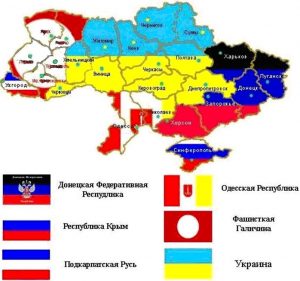
Indeed, since Zelenskyy tells little about his policies, the most promising way to understand his views is to analyze his film. Alexander J. Motyl, a professor of political science at Rutgers University-Newark, was among the first to use such an approach. He concluded that Ukraine is depicted almost completely Russian-speaking in the film, and most Ukrainians speaking Ukrainian look like radicals.
In reality, Ukrainian is spoken at least as often as Russian in Ukraine and is used overwhelmingly within the government and state institutions. Ukrainian corruption is also significantly exaggerated and shown as the main problem in Ukraine, together with the complete absence of Russia, Russian aggression, or Putin in the film. In this alternative world, Crimea and the Donbas seem to be not occupied, and Ukrainian soldiers are not dying on a daily basis.
- Kseniya Klym, a warrior from Donbas, asked Zelenskyy to apologize for his cynicism at jokes about the Tomos, the bill of independence for the Ukrainian church which was obtained in January 2019. “In January of this year, you allowed yourself to ridicule the values that are sacred for me, my relatives and millions of Ukrainians. You laughed at Tomos and the Ukrainian Autocephaly. You are the descendant of the sons of Abraham and the representative of the Jewish people and know well what are the holy and untouchable topics. Why did you allow yourself to laugh at what is sacred to me?” A similar video came from the priest Oleksandr Dediukhin.
- Iryna Herashchenko, First Deputy Chairman of the Verkhovna Rada, asked Zelenskyy to apologize for his humiliation of disabled children and children with Down’s syndrome. “We have been working hard to implement inclusive education, and have fought for the rights of disabled children for employment and self-fulfillment. Europe is, above all, respect for human rights, respect for other people.”
- Ivan Lepich, a veteran from Rivne, appealed to Volodymyr Zelenskyy and asked him how a person calling Ukraine “an actress for German films for adults” and naming the war in Donbas as “moving borders aside” can aim for the position of President. He also gave Zelensky 24 hours.
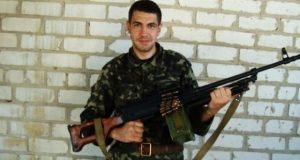
Poroshenko, on the other hand, is portrayed by his opponents as a Putin hater and even the President who suppresses Russian-speakers. There was no single fact of Poroshenko deciding to discriminate against Russian-speakers, but this is a message spread by Russian propaganda and, also, by people indifferent to questions of national identity which Poroshenko stresses in his speeches.
This portrait of being a enemy of Putin is something which Poroshenko’s oppoarenents dislike. Poroshenko is blamed for speculating on the issue of war, especially against the background of economic problems and poverty.
But Poroshenko’s pre-election strategy exploited this image – he was portrayed as the only president who can withstand Putin. The billboards put up around the country a few days ago are a good illustration: Poroshenko is shown facing off Putin.

Poroshenko’s team says the boards suggest that the President should be powerful enough in order to withstand Putin’s aggression, including at the time of hard negotiations. However, Zelenskyy’s supporters, and, particularly, the former candidate for the Presidency Anatoliy Hrytsenko say that such boards imply Zelenskyy is pro-Russian and voters should choose between Putin and Poroshenko, which is a manipulation.
However, the day before the boards were installed, Poroshenko told on TV that he doesn’t have any facts to accuse Zelenskyy of being pro-Russian. But he thinks that Zelenskyy has not enough knowledge, experience, and strength to withstand Putin.
Read more:
- Do Ukrainians actually believe life was better in the Soviet Union than in France and Germany?
- Only 1% of diaspora Ukrainians voted in presidential election. Should the system be changed?
- Ukraine’s presidential campaign goes showbiz as Poroshenko attempts to rebound after first round
- Hacked 2014 docs from Russia’s LDNR party outline plan eerily similar to Zelenskyy campaign
- Praise for Ukraine’s democracy after first round of elections





